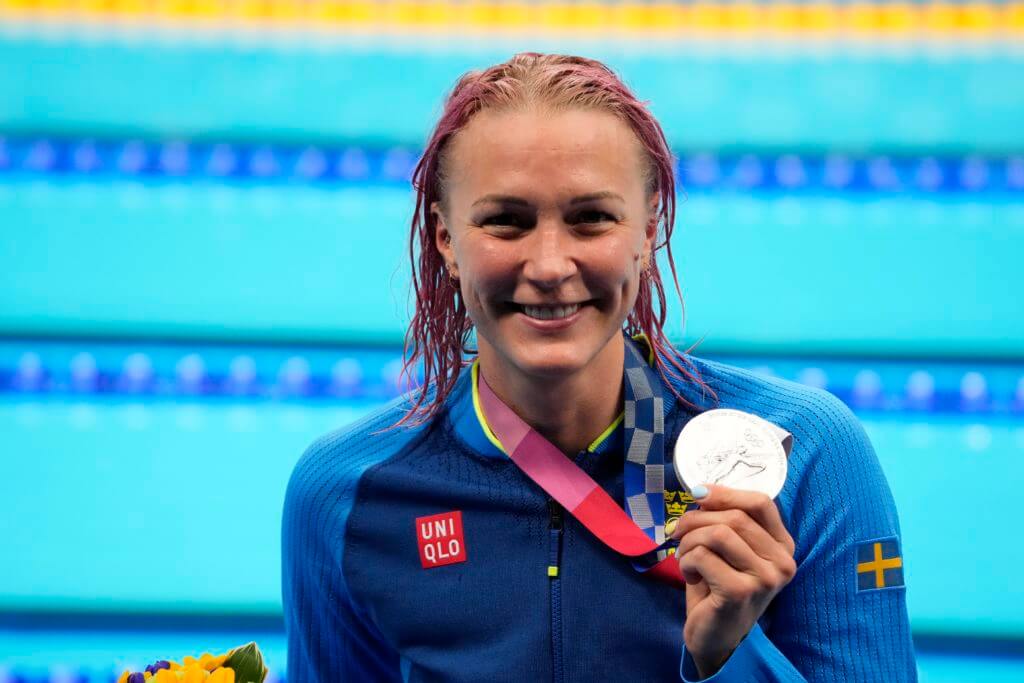Sarah Sjostrom Receives Olympic Resilience Award After Comeback to Win Silver

Editorial content for the 2021 Tokyo Olympic Games coverage is sponsored by GMX7.
See full event coverage. Follow GMX7 on Instagram at @GMX7training #gmx7

Sarah Sjostrom Receives Olympic Resilience Award After Comeback to Win Silver
(From September’s Swimming World Magazine)
Despite fracturing her elbow in February and undergoing surgery to have screws and a metal plate inserted, Sweden’s Sarah Sjostrom was not only able to compete five months later at the Tokyo Olympics, but also claim a silver medal in the 50-meter freestyle on the final day of competition.
**********
In early February, Sarah Sjostrom’s preparation for her fourth Olympic Games was derailed when she slipped on ice and fractured her elbow. She immediately underwent surgery and had screws and a metal plate inserted, but Sjostrom was expected to be out of the pool for months as she tried to make a full recovery. Once she returned to the pool, Sjostrom had mere months to go before the Tokyo Games.
Sjostrom won her first three Olympic medals at the 2016 Olympics (gold in the 100 fly, silver in the 200 free and bronze in the 100 free), and she has earned eight World Championships gold medals across a decade-long span (2009 to 2019) in the 50 free, 50 fly and 100 fly. She has had most of the success over her career in fly, but given the circumstances of her injury, she suggested that she may concentrate on sprint freestyle for Tokyo and possibly even eschew the opportunity to defend her 100 fly Olympic title from 2016.
Sjostrom’s 2021 racing schedule prior to the Games was incredibly light: the Mare Nostrum meet in Canet in early June followed by the Sette Colli meet in Rome a few months later. It turns out that was enough, and Sjostrom decided to enter all three of her signature events at the Olympics, the 100 butterfly, 100 freestyle and 50 freestyle. She held the world record in all three races, although no one was expecting her to be at that level so close to her injury.
Indeed, when Sjostrom showed up in Tokyo, she was not perfect, but for a swimmer who just spent months rehabbing an injury, she acquitted herself nicely.
Sjostrom opened the Games with the 100 fly, the race about which she had been so unsure, and while she was behind in her heat at the start, she came back with the closing speed that has been her signature since she broke her first world record at age 15, to touch out American teenager Torri Huske. Sjostrom’s time in that race was 56.18, and she looked completely shocked and thrilled as she glanced at the scoreboard.
“Today I felt extremely strong, and it was my best time in like four years,” she said. “Obviously, that’s a big surprise after the preparations I’ve had the last six months.”
During the first morning of finals, Sjostrom led off Sweden’s 400 freestyle relay in 52.62, breaking the Olympic record at the time. She did not manage to improve on her 100 fly prelims time, and she ended up finishing seventh in the final, but it was the freestyle events that Sjostrom had been targeting. A few days later, the 27-year-old Swede qualified for the 100 free final and finished fifth in what was the fastest field in history in that race.
Still, Sjostrom was without a medal heading into the last two days of the Olympics and her final race, the 50 freestyle. She qualified fourth after prelims and third after the semifinals, and then, in the final, she secured a silver medal. Her time was 24.07, nowhere close to her world record of 23.73, but that did not matter one bit to Sjostrom. After three Olympic medals at the 2016 Rio Games, Sjostrom added a fourth, the least likely of any medal she has won in a lengthy international career.
“This is one of my biggest achievements in my career. I’ve been winning a lot of medals and breaking a lot of world records, but this has been the toughest challenge so far,” Sjostrom said. “We didn’t know if I would make it all the way to the podium—we were just like, ‘Maybe a final if I can.’ It has been a really hard journey, but it has definitely made me even tougher as an athlete.”
For that stunning performance, Sjostrom was undoubtedly the most resilient swimmer in the pool in Tokyo.




